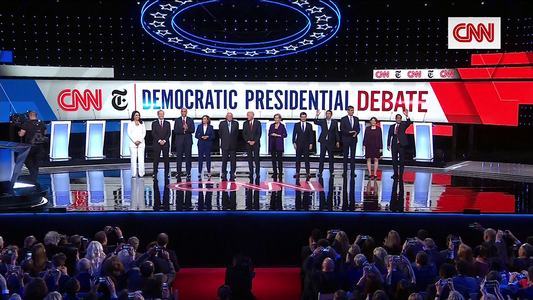It was a dramatic and violent week in Syria. On Friday, the fighting eased -- but many questions lingered. The panelists discussed the quickly unfolding events, and the conversation later turned to the latest on the impeachment inquiry into President Donald Trump.
Full Episode: Showdown in Syria, impeachment inquiry heats up
Oct. 18, 2019 AT 9:39 p.m. EDT
TRANSCRIPT
Notice: Transcripts are machine and human generated and lightly edited for accuracy. They may contain errors.
ROBERT COSTA: The Trump White House confronts impeachment threats and a serious showdown.
VICE PRESIDENT MIKE PENCE: (From video.) Turkey and the United States of America have agreed to a ceasefire in Syria.
MR. COSTA: But was it a ceasefire?
SENATOR MITT ROMNEY (R-UT): (From video.) What we have done to the Kurds will stand as a bloodstain in the annals of American history.
MR. COSTA: And on Capitol Hill, top diplomats provide explosive new testimony in the impeachment inquiry.
HOUSE SPEAKER NANCY PELOSI (D-CA): (From video.) We’re not here to call bluffs. We’re here to find the truth, to uphold the Constitution of the United States.
MR. COSTA: And the White House scrambles to deny a quid pro quo withholding military aid to Ukraine.
WHITE HOUSE CHIEF OF STAFF MICK MULVANEY: (From video.) We do that all the time with foreign policy. And I have news for everybody, get over it.
MR. COSTA: Next.
ANNOUNCER: This is Washington Week. Once again, from Washington, moderator Robert Costa.
MR. COSTA: Good evening. It has been a dramatic and violent week in Syria, and on Friday the fighting did ease, but many questions linger. The pause in the standoff between Kurdish forces and Turkey, which was brokered by Vice President Pence and Secretary of State Mike Pompeo, it remains fragile. There have been reports of gunfire. Still, President Erdogan of Turkey insists he is abiding by that agreement, for now. President Trump says he takes Erdogan’s word. Others, however, are on edge about Turkey’s military push, including Kurdish allies, who have accused Turkey of war crimes. The president’s actions in Syria have also unleashed a firestorm of criticism from top Republicans.
SENATOR LINDSEY GRAHAM (R-SC): (From video.) Any commander in chief who gives territory back to the enemy that was seized by blood of our allies and our soldiers is doing a great disservice to the military. ISIS will most certainly reemerge.
MR. COSTA: Joining me to discuss these quickly unfolding events, Ashley Parker, White House reporter for The Washington Post; Susan Davis, congressional correspondent for NPR; Vivian Salama, White House reporter for The Wall Street Journal; and Jeff Mason, White House correspondent for Reuters.
Vivian, you’ve been covering foreign policy for years, now covering the White House. How are U.S. allies responding to this unfolding situation in Syria?
VIVIAN SALAMA: I mean, this is something that has implications for countries around the world, and so obviously a lot of concern growing, especially in Europe, Middle Eastern countries, because at the end of the day a big part of the reason we were there to begin with was to contain ISIS, and essentially a number of people saying that this was what was so important – it was so important for us to stay in Syria because of U.S. national security. ISIS grows, it spreads, the potential for attack grows, and so European countries obviously very worried about that. They’re worried about another flood of refugees across their borders as well as a number of other issues. Obviously, Middle Eastern countries also afraid of spillover. And so this has repercussions that are being felt around the world.
MR. COSTA: And did President Erdogan play President Trump here? What’s the view inside the White House about how this ceasefire came about and whether it will hold?
ASHLEY PARKER: Well, we have that Zelensky transcript with the president. I think everyone would love to see the transcript of this call with Erdogan. But you can safely say that people inside his administration were shocked at the news. On the one hand it wasn’t that surprising because the president campaigned on ending endless wars, withdrawing – he threatened to withdraw from Syria previously, but this is something that came so quickly, that was not sort of well-planned or well-expected, and that goes against the recommendations and advice of a number of top people in his administration. And one thing that’s reflective of that that I think cannot be overstated enough is that we are finally seeing real criticism from Republicans on Capitol Hill, and Republicans never criticize this president ever. So to see so many people, including someone like Senator Lindsey Graham – a golf buddy, a close friend – coming out and saying on this policy this was the wrong decision, this was unacceptable, just sort of underscores how much alarm there really is within the administration and the Republican Party.
MR. COSTA: Susan, you’re on Capitol Hill for NPR. Is there alarm not only among Republicans, but among Democrats in the leadership in the House about the situation for the Kurds and their fate?
SUSAN DAVIS: Yeah, I mean, there’s alarm. I think lawmakers have been appalled by this. The president’s really lonely here. He doesn’t have the support even of some of his former administration officials who stepped down over this policy, people like former Defense Secretary James Mattis. I think, you know, Congress can’t often agree that today is even Friday let alone agree on a major policy like this, and you saw earlier this week that the Congress voted – the House voted overwhelmingly on a symbolic resolution, but condemning, essentially, the president across the board for all of his actions and the implications here. This united – when you’re uniting Liz Cheney, a Republican from Wyoming, and Alexandra Ocasio-Cortez on a policy issue, you know you’re in a pretty unusual place.
MR. COSTA: But let’s get into why that is and the – your point, Sue, about the president being alone. He sent an unusual letter to President Erdogan. He wrote, quote, “Let’s work out a good deal! You don’t want to be responsible for slaughtering thousands of people.” And “Don’t be a tough guy. Don’t be a fool! I will call you later.” Erdogan reportedly found the letter insulting, and some Republicans and Democrats were confounded by it. Jeff, when you’re at the White House, what motivated the president to do this, to send that letter? Are there any guardrails around him?
JEFF MASON: The answer to the second question is no. And as far as his – what motivated him, this is just pure Trump. It is the – I think some people when they first read that letter wondered if it was actually real because the language was so informal, and apparently President Erdogan has also said this isn’t a big priority right now but there will be a response to this letter at some point. But it is just – it was Trump being Trump, using language that he uses on a regular basis with somebody who he considers a friend but also somebody who he was trying to challenge after all the criticism that he himself faced for this decision.
MR. COSTA: So there’s no one in the Cabinet who’s pushing back. Is the president alone, based on your reporting?
MR. MASON: I think the president is largely alone, yes. I mean, I think even someone like John Bolton, who has now obviously left the White House, would have been – was someone who was pushing back on things like this. He doesn’t have that anymore. He doesn’t have a John Kelly. He doesn’t have a chief of staff who is trying to have any sort of a mitigating influence on the president. You see that with Mick Mulvaney very clearly. He’s somebody who wants to keep this job. He still has the acting title. He’s not trying to control the president.
MR. COSTA: So the president is trying to negotiate on many fronts as the leader, as someone who’s engaging on his own, but what are the shifting power dynamics, Vivian, in the Middle East? Are we seeing now Russia walk into a vacuum in Syria? What does it mean for Iran? How does the president – he may think he can deal with Erdogan, but what does it mean regardless of his actions for the region?
MS. SALAMA: I mean, we’ve left a vacuum. And it’s a little bit complicated for people who don’t follow the Middle East on a daily basis, but essentially a lot of what happened just in the last two weeks in part reversed a lot of the progress that the Kurds and other Syrians have made in their civil war for the last eight years in terms of the Kurds running back to Assad, to ally – to ally themselves with him. In the meantime, our departure gave an open door for the Russians to come in and basically fill that vacuum where they decided, OK, well, if the U.S. is not going to be there we’ll provide our services. They have helped Turkey, but they’re also allied to Assad and with Iran. And so there’s all these different players coming in, players that the United States typically would not want to see getting a stronger foothold in the Middle East. But within two weeks we already saw such a drastic shift, and it’s alarming to think of what would come.
MR. COSTA: Ashley, when you think about President Trump, he’s writing these letters to Erdogan and he’s directing his own foreign policy. But you still had Vice President Pence and Secretary of State Pompeo go over there to try to negotiate this ceasefire. Are they trying to clean up their own president’s actions? What is their role, based on your reporting?
MS. PARKER: Well, the president spun that ceasefire or pause, as he even put it in a tweet, as a victory, but what they were really doing was they were going over for, you know, less than 48 hours, basically, and trying to undo the damage that was caused by the president’s decision just 10 days earlier. So it requires a little bit of creative spin to claim that you helping to slightly undo a catastrophe that you caused is a win.
MR. COSTA: We had heard from one of President Trump’s staunchest allies on Friday, Senate Majority Leader Mitch McConnell, who penned a strongly worded op-ed in The Washington Post. He said that Mr. Trump’s decision to pull out troops in northern Syria was a grave strategic mistake and it’s something that will leave the American people and homeland less safe and embolden our enemies. McConnell did not refer to the president by name.
MS. DAVIS: Didn’t have to. (Laughter.)
MR. COSTA: He didn’t have to.
MR. MASON: Didn’t have to.
MS. DAVIS: Part of what was striking to that – and we’ve heard that from other Republicans – from McConnell, Michael McCaul, former Homeland Security chairman in the House, now in Foreign Affairs – directly saying that the president’s actions are increasing the risk of a domestic terror attack. Wow, right? I mean, Mitch McConnell has also said we don’t know what it’s going to look like yet, but it doesn’t seem likely that the potential ceasefire is going to stop Congress from moving forward on sanctions legislation next week. Nancy Pelosi in the House has already said the House will take up a bill. McConnell’s indicated he wants to do something too. If anything, what’s been interesting is he’s indicating he wants to go stronger and tougher.
I mean, McConnell, for him I think this is a – for a lot of Republicans and Democrats, this is a personal policy issue that goes beyond partly loyalty, Donald Trump’s 95 percent approval rating among Republicans. This is bigger than all that. And the response that we’re going to see, and the details in the sanctions, are going to be very interesting to watch.
MR. MASON: It’s also interesting about that, to me, is how the president – that’s beginning to get to him. At the very beginning, I remember – I think I was in the Roosevelt Room the first day or two after he made that decision. And we asked him for a reaction to the Republican criticism. And he was very tame for President Trump. He said, it’s – I understand their position. That’s not my position, but I understand it. Increasingly, as this criticism has increased, his response to that has also become more belligerent.
MR. COSTA: But the Evangelical Christians who are part of his political base are – it’s not just Mitt Romney, the Utah senator. Some of his base supporters.
MR. MASON: Yeah, absolutely. And that’s no doubt one reason why it’s going through his head is, hey, maybe this is a problem, because he needs those Evangelicals to come out, just like he needs the rest of his base to come out in 2020.
MR. COSTA: Is the White House reaching out to those voters or those leaders at all?
MR. MASON: That’s a good question. I was curious about that too, with Vice President Pence this week traveling. He would probably be the point man for that. But I don’t know.
MR. COSTA: What about Democrats? You saw in the Democratic debate this week Representative Gabbard of Hawaii. She’s talking about she’s against regime change wars and non-interventionism. About your point, he’s a non-interventionist. There’s also that strand in the Democratic Party. Are they full-throated hawks now on Syria, or are they having their own discussions and debates?
MS. SALAMA: They’re definitely having their own discussions, and it’s so much so that it actually prompted Hillary Clinton to weigh in today. And she said that the Russians are actually watching and have their eye on one particular candidate, you know, which – she didn’t name any names as well, but as you said Tulsi Gabbard was really promoting this idea of, well, you know what? Like, we should leave them to their vices, and maybe we should – we should see how this plays out.
The interesting thing – I just want to make one point, to Jeff’s point. Is, like, a lot of these members of the Hill have learned from past experiences. They’ve learned from precedent. And, you know, President Obama hastily withdrew from Iraq in 2011. And we ended up going back there three years later because of the fact that ISIS started to grow, our absence was definitely something that created this whole problem where, you know, extremist elements were able to kind of fester around. And a lot of members on Capitol Hill remember that very well and keep on warning that we stay and this is going to get worse.
MS. PARKER: But one counterpoint, which Jeff is totally right that the president – that criticism is now getting to him. But one thing that’s been interesting is he’s had a couple of rallies where he’s talked about this. And when he talks to his rallies – which, again, are his core, core, core base supporters, and he talks about endless wars, and bringing troops home, and not spending money overseas that should be being spent here, that’s still a big applause line. He gets people chanting bring them home, bring them home. And so the president – he cares about his base. He needs to care about Evangelicals. He especially needs to care about Republicans on Capitol Hill as he’s facing an impeachment. But for those core supporters who energize the president, they are 100 percent on board at least with the Cliff’s Notes pitch, which is: We’re ending endless wars and we’re bringing our troops home.
MR. COSTA: Will his base stick with him? That is such – that is such an important question, as we look not only at Syria, but the president’s impeachment probe and the possible impeachment of him on Capitol Hill. And he faces challenges there. Top diplomats from the Trump administration appeared on Capitol Hill this week to testify in the House impeachment probe.
MR. COSTA: (From video.) And a picture began to emerge of President Trump’s shadow foreign policy, run by his personal lawyer Rudy Giuliani. First, the former National Security Council director in charge of Ukraine policy testified that she and John Bolton were alarmed about rogue efforts to pressure Ukraine involving Giuliani, White House acting Chief of Staff Mick Mulvaney, and the U.S. Ambassador to the EU, Gordon Sondland. On Thursday, Ambassador Sondland, a Trump donor, testified that the president told him to deny that there was any quid pro quo. And Michael McKinley, who quit last week as an advisor to the secretary of state, said he was disturbed by attempts to use foreigners to hurt the president’s political opponents. Mulvaney appeared to contradict the president on Thursday.
QUESTION: (From video.) So the demand for an investigation into the Democrats was part of the reason that he ordered to withhold funding to Ukraine?
WHITE HOUSE CHIEF OF STAFF MICK MULVANEY: (From video.) The look back to what happened in 2016 certainly was part the thing that he was worried about in corruption with that nation. And that is absolutely appropriate.
QUESTION: (From video.) Withholding the funding?
WHITE HOUSE CHIEF OF STAFF MICK MULVANEY: (From video.) Yeah.
QUESTION: (From video.) Let’s be clear, what you just described is a quid pro quo. It is funding will not flow unless the investigation into the Democratic server happened as well.
WHITE HOUSE CHIEF OF STAFF MICK MULVANEY: (From video.) We do – we do that all the time with foreign policy. And I have news for everybody, get over it. There’s going to be political influence in foreign policy. That is going to happen.
MR. COSTA: Sue, I’ll tell you one group, based on my reporting, who’s not getting over it: House Democrats. How does Mick Mulvaney’s statement change their calculation, their strategy, on impeachment?
MS. DAVIS: Well, I think House Intelligence Chairman Adam Schiff’s words were something like things have gone from bad to worse, when he – in response to Mulvaney’s comments in the podium. I mean, he really screwed up here, on a lot of levels, right? I mean, clearly his intent was to come out into the White House briefing room and help the president, because he’s the acting chief of staff. But the effect of this was not only did it give ammunition to Democrats, in which he was seen as sort of admitting to the underlying heart of the matter of the president’s activities here. But he also blew up three weeks of Republican efforts to kind of get on the same messaging page, explain what the strategy was. And he just left the Republicans on Capitol Hill, who both have to deal with the impeachment and potentially the trial in the Senate, in many ways incapable of defending what he said.
MR. COSTA: Is it a crisis inside the White House?
MR. MASON: Well, the people inside the White House will say that this is a crisis like any other crisis they’ve seen. Mick Mulvaney said at that press conference that we don’t need a war room because, A, he did nothing wrong and, B, this is the kind of stuff that we deal with all the time. But Republicans who are allied with the White House, and former administration officials, told me this week, look, it’s just not enough. It’s not enough for the president to be the one-man communications director who sends out all of his thoughts on Twitter. And also, one administration official saying to me, if Mick Mulvaney wanted to move the impeachment vote up faster, then that’s essentially what he achieved with his remarks at that press conference.
MR. COSTA: So then why did Mick Mulvaney do this?
MS. PARKER: Well, the president wanted him to go out and do a briefing. And originally, he wanted Mick Mulvaney to explain why, which hasn’t gotten as much attention as it would in any other news cycle or in any other administration, that the administration had decided that the site of the G-7 should be the president’s resort in Doral. He wanted Mick Mulvaney to go out and explain that. And Mick Mulvaney did try to explain that. He said, we understand it looks horrible, but Doral was just the best site.
MR. COSTA: Right. But you also wrote this week, Ashley, about how Mulvaney’s comments and so many other things, you summarize all these different points, are bringing the president’s fingerprints onto the impeachment probe in a significant and new way. What did you find as you sketched it all out?
MS. PARKER: Well, between Mulvaney’s public comments and all of the private comments, what is clear is that at the center of this probe is the president himself, and that he is personally orchestrating and directing his government, and marshalling the full force of the federal bureaucracy behind it, to try to push Ukraine to intervene in domestic politics. And he is doing that, and he is telling a number of his aides to go to his personal attorney, Rudy Giuliani, and basically do end-runs around all the foreign policy experts, and all the appropriate people, and all the normal experts you would find in the chain of command, and work on a shadow foreign policy, a shadow government with Rudy Giuliani, and enlisting these people in a way that even they’re uncomfortable with.
And the reason this probe is moving so far ahead so quickly is because you’re seeing people who, frankly, are willing to testify because they are eager. They were alarmed. They were raising concerns. And they are more than happy, under the cover of subpoena, to go up to Capitol Hill and tell impeachment investigators everything they know.
MR. COSTA: So do expect the dam to break a little bit more with your sources in the National Security world, Trump administration officials? The White House continues to assert executive privilege, yet these officials keep testifying. What does that tell us, and what’s next?
MS. SALAMA: It tells us that there are a lot of people within the government that, A, saw a problematic series of events that have been happening in the last year, particularly surrounding the role of President Trump’s outside lawyer, Rudy Giuliani, his personal attorney. And that’s been sort of the theme of a lot of these depositions is, you know, what was Rudy Giuliani doing? Was there, in the words of one person, a sort of shadow diplomacy going on where he was dealing with Ukraine and the NSC and the State Department were cut out? That was seen as very problematic for a number of these people. I happened to ask Mick Mulvaney yesterday during that press conference, you know, do you think that Rudy Giuliani’s role is problematic, and he said the president is free to conduct his foreign policy however he sees fit and it’s not his place or anyone else’s to essentially to try to stop that from happening, and so it’s very interesting to see these mixed messages.
The other thing is, remember, President Trump likes to control messaging in general very tightly. He likes to be his own spokesman; we know this. There was an effort to put together sort of a war room of sorts to respond when this impeachment inquiry first came. That never really came about. The campaign tries to kind of fill that role, but it’s never really happened. And so what we see here is basically a lack of any concrete strategy, and that’s essentially what ended up happening yesterday with Mick Mulvaney coming out to the mic where he was supposed to be talking, as Ashley said, about something completely different, and basically just came under attack by reporters who wanted him to answer questions, and that’s what ended up happening. He ended up digging a hole that’s deeper than they’re already in.
MR. COSTA: And amid all this, Jeff, I keep coming back to the question of why. And when you hear about the reports of the testimony, the president can’t let go of 2016, whether it’s a conspiracy theory or his own beliefs about what happened. Is that the reason this all happened – the shadow diplomacy, Rudy Giuliani – was it 2016, or was it something else?
MR. MASON: I think it’s largely that, yes. I mean, I think you’re right to say he’s fixated on 2016. He is –
MR. COSTA: But he won, Jeff.
MR. MASON: I know, but he doesn’t like the fact that people think he may have won illegitimately. So if he can prove or find someone else to prove that it wasn’t Russia, it was Ukraine, and it was Ukraine working with the Democrats, and that’s why the server is in Ukraine, and let’s look into that, then that would – that would assuage his concerns about anyone suggesting that he won in a way that wasn’t completely honest, yes.
MR. COSTA: And you’re seen him up close. You’ve spoken to him and President Putin at the same time.
MR. MASON: Yes.
MR. COSTA: Do you ever think about that exchange after all this?
MR. MASON: Oh yeah, yeah. Yeah, I mean, it was – it’s surreal, really. I mean, that particular press conference will –
MR. COSTA: Where was that?
MR. MASON: That was in Helsinki. I mean, they were standing next to each other and President Trump was taking largely the side of the Russian president over U.S. intelligence officials. And that sort of came up again this week in the fact that Nancy Pelosi, during their meeting in the White House, said all roads with you lead back to Putin.
MR. COSTA: Let’s talk about Speaker Pelosi. What a scene at the White House – each side pointing fingers, these photos that emerged of this standoff across the table. She said the president had a meltdown, he said she had a meltdown. What’s the speaker’s view? Take me inside House Democratic politics as they deal with this embattled president.
MS. DAVIS: Well, I would think that the image that the White House released of her standing up to the president, I’m not sure it had the intended effect of what I think the president had. You know, her office quickly made it their banner photo on Twitter; I mean, the image of the woman standing up to the president is not necessarily an image that Nancy Pelosi has a problem with. You know, I think when she goes into these confrontations with the president it strengthens her hand within the Democratic caucus because it looks like she’s willing to take the fight to Trump in the White House, in the Cabinet Room, at a table surrounded by men, and I think that gives her – the internal politics of that strengthens her hand. You know, I think the sum total effect of this week is the House has moved closer to impeaching Donald Trump. You know, we don’t know it’s there yet, but they moved closer in that direction. And I think that Pelosi’s question – challenge is you have a lot of Democrats who support the investigation. She’s not going to bring articles of impeachment to the floor unless she knows they can pass; there’s no losing that vote. And she has to keep this caucus together, and that is her challenge. I think it was easier this week based on the testimony, based on the White House meeting, based on Syria policy in some way – it’s not related to impeachment, but in terms of – it united opposition.
MS. SALAMA: I was going to say the irony of the whole thing is that impeachment supposedly didn’t even come up in their meeting; it was all about Syria policy. And yet, that is the backdrop and like weighing so heavily on both sides that it ended up being sort of what broke the meeting at the end of the day. I mean, that’s how a lot of people interpreted it. At the end of the day, they stormed out over Syria policy, but the rest – the context behind it was so much greater that, again, like, Nancy Pelosi really wanted to use that to go back and say, you know, this is how I’m standing up against the president, in this case about Syria but in general.
MR. COSTA: On Wednesday, President Trump hit the thousand-day mark. They’re having these showdowns with the speaker, House Democrats, Syria. Inside the West Wing, do they feel the heat or not?
MS. PARKER: Yes and no. It depends on who you ask and on the day because, as Jeff said – they’re absolutely feeling the heat. The president is facing an impeachment inquiry. Just in terms of pure reality, this is the most vulnerable moment in his presidency thus far, and they feel that and they understand that. The flipside is this is a White House who has been under siege, under attack, and operating in sort of freewheeling chaos that the president himself encourages since day one, so the feeling in a lot of ways is quite familiar.
MR. MASON: It’s also a White House that believes that it can do anything it wants. I mean, Mick Mulvaney sort of made that clear in his press conference; he said, get over it.
MR. COSTA: If anything was clear, it was the White House is pretty confident about its position – but we’ll keep an eye on all these points. We’re going to have to leave our conversation there tonight because we want to pay tribute to Congressman Elijah Cummings of Maryland, who died October 17th at age 68. The son of sharecroppers and a civil rights leader, he was a trailblazer in both Baltimore and national Democratic politics, and most recently he served as chairman of the powerful House Oversight Committee. For us reporters who knew him and for Americans across the nation, he was a strong voice, always returning to themes of justice and truth. When he spoke, you listened.
(Pause.)
Thanks for sharing your evening with us. The Washington Week Extra is coming up next on our website, Facebook, and YouTube.
I’m Robert Costa. Good night.
MOST POPULAR
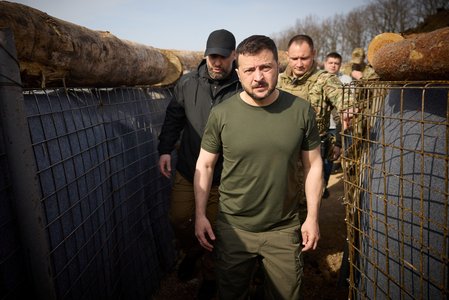
Preview: Coming Up on Washington Week with The Atlantic

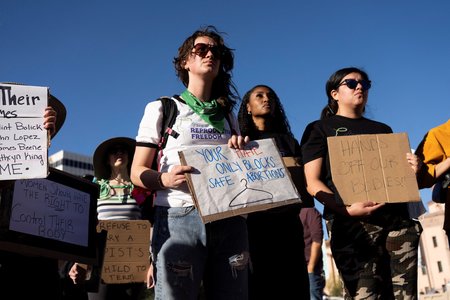
Full Episode: Washington Week with The Atlantic full episode, 4/12/24

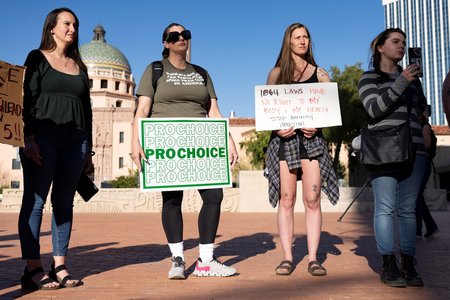
Clip: Democrats seize opportunity to make gains after Arizona abortion decision

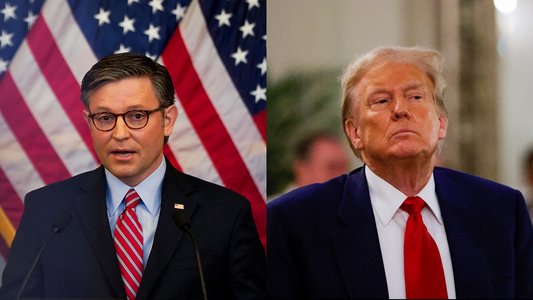
Clip: Johnson visits Mar-a-Lago to shore up support from Trump amid uncertain speakership
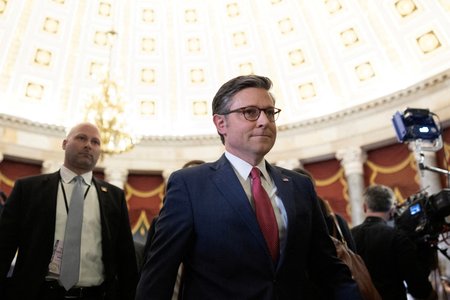
Preview: Coming Up on Washington Week with The Atlantic

© 1996 - 2024 WETA. All Rights Reserved.
PBS is a 501(c)(3) not-for-profit organization
